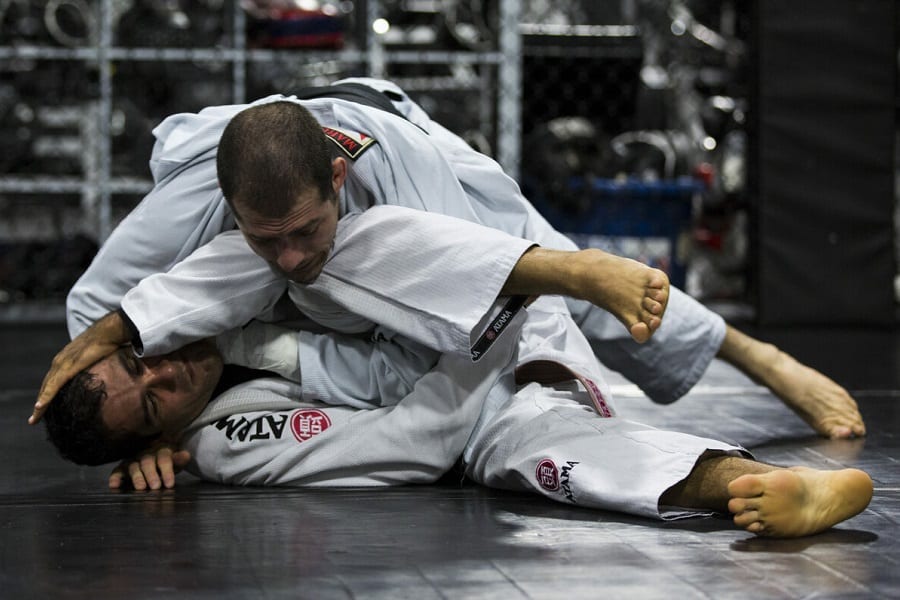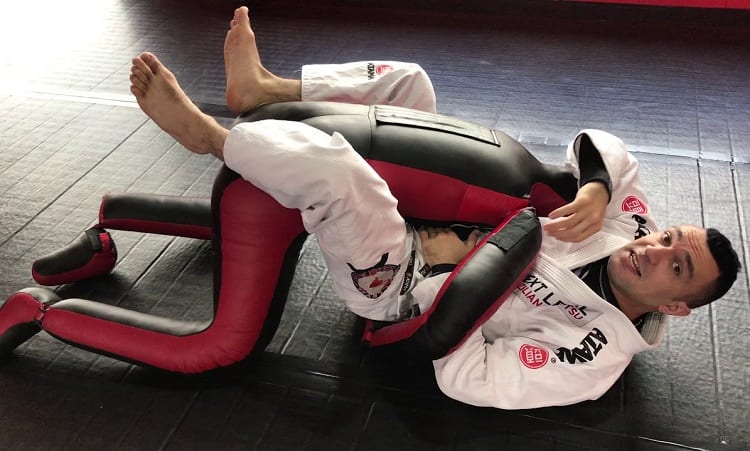Jiu-jitsu is a unique discipline that stretches the mind and pushes limits every day. When I first started training, I never thought I would ever post up on my knees or control someone with an armbar. Now they’re standard parts of my game.
The best moments happen when you least expect them. One day you’re just a white belt; the next, an experienced BJJ practitioner.
It’s hard to wrap your head around the rapid changes in your status, but there are some great tips for BJJ white belts to improve your game.
Here are 44 Actionable Tips for BJJ White Belts:
1) Be humble and always respect your opponent
If people tap you, it doesn’t invalidate anything you tried to do. It means they overcame the obstacle in front of them.
You may have just learned a new technique that will help you in the future, given the same situation and opponent.
2) Be diligent with your learning from each technique you try each day
When we get frustrated from failed attempts, we often don’t go back to the beginning and review what happened.
This can make it more difficult for us to learn from our mistakes because we might believe they were our fault.
3) Do not lose faith in your coach
Trust the process when you first start training. You won’t realize that there is a process to everything, including your learning.
There are specific steps all techniques will go through before being ingrained in our memory and part of our game.
The good news is that every technique will eventually fall into place with enough repetition and patience.
4) Accept that setbacks happen
Sometimes you fail (even if it doesn’t feel like it). Stay persistent! It takes a lot of work to get things right with any new skill set one attempts to learn. Everyone has to go through this, so don’t feel bad if you are ‘stuck’ for some time on a single technique.
The body doesn’t move forward without resistance, so plan on pushing through some uncomfortable moments and frustrating times.
5) Have a clear goal in mind for when you step onto the mat
Decide what you want to accomplish, and focus all your energy on achieving that particular task.
Go with a mindset of accomplishment! When you focus your intent in that manner, it will be easier to ignore the occasional flurries of irritation that are bound to come your way during training sessions.
6) Stay humble while learning new techniques from higher belts
Even if you feel like you know a lot, it’s normal to feel like you didn’t get the correct information when the advanced techniques are taught. But it’s important to stay respectful of why someone would want to teach you.
7) Don’t be discouraged by one little thing that ‘doesn’t work’
Try not to let one little thing discourage you from what you’re learning. For example, if your coach tells you something “isn’t quite right” or “doesn’t feel right yet.” If you are determined and do not give up, you will eventually make the correct movements happen.
8) Educate yourself on techniques that are around your belt level
Find out the minimum requirements you need to understand at the white belt level to be successful. Learn the most fundamental techniques from the best players in your class. This will help you to bridge from the white belt to the blue belt faster.
9) Survival is one of the best skills to focus on

I know BJJ is a lot of fun. But less so when you don’t see what you’re doing, and you’re getting demolished every time you roll with someone more experienced.
One of the first things you should learn is how to hold your ground. Understand the principles of solid guard retention and few escapes, and this will be a game-changer in your first months.
10) Learn the proper fundamentals
Your body needs to adjust to the way you move on the mat. It’s weird at first, but eventually, the movements become second nature.
Hip bump sweeps and Americanas are great for beginners but also learn the underlying movements of BJJ. Things like shrimping, bridging, rolling forward, and elbow escapes can boost your results in record time.
11) Listen to what the teacher says in class and ask a ton of questions
Details matter in BJJ, those minor adjustments that only come with years of experience can 10x your results. Don’t be afraid to ask questions or to get further clarification when you don’t understand.
12) Be ready to work for your belt
Moving forward in the BJJ belt system isn’t an easy task. Going from white to black belt can take easily ten years of training for most people.
It’s essential to keep in mind that if you want a higher belt, you must have a good work ethic and be willing to push your mind and body to some limits.
13) Enjoy yourself!
What’s the point of training day in and day out if you’re not having fun? Try to look forward to the next time when you can go back out there and work on improving.
You’ll be surprised how much you’ll improve in such a short time when you’re having tons of fun rolling with friends.
14) Pay close attention to the top competitors in your class
They train HARD and have a LOT more experience than you (by default). Study them and see how they approach each position differently from the next guy. You can learn so much by watching other people train; keep your eyes open!
15) Put in the work!
Be disciplined, motivated, hungry, and constantly striving for improvements. The world-class BJJ athletes are not always the most talented, but they are always putting in the work required to compete at their level of excellence.
Attending seminars, watching videotapes of top players, and going to tournaments (especially at a lower belt level) will help you improve.
16) It’s okay if you aren’t winning titles every day!
Every white belt has a day when they land a leg sweep and tap out their opponent. That’s why they’re working so hard to improve. It takes time to develop your skills and work on new positions, techniques, and strategies.
Don’t get discouraged when your win-loss record isn’t looking great at the beginning of each tournament season.
17) Train with a suitable partner
Find someone who doesn’t give up! Someone who will roll with you when you want to lay down and quit, someone who will exaggerate attacks on your legs until your defense is perfect.
You can learn a lot from a great training partner or coach, so make sure this person motivates you and keeps pushing you to excel.
18) It’s not a weakness to give up in a fight
As mentioned above, don’t let your ego get the better of you when sparring. If you find that your defense is broken or someone is finding a way to finish you off, there’s no shame in tapping out.
Even when I was at my best, I remember times when the other person could have slapped me, and I would have just given up and tapped with my arms pinned behind my back. But it’s all part of the Jiu-Jitsu game. Embrace it!
19) Don’t be afraid to make mistakes
Because Jiu-Jitsu is a constantly evolving sport, there are no set laws to what is and isn’t good Jiu-Jitsu. So when you start out learning something new, don’t be afraid to try whatever you can to figure it out.
20) Don’t yell at your training partners for putting in work on top of you
They are trying to improve just as much as you because they want it just as bad.
Be thankful that they are being relentless and putting in work on top of you when it can be easy for them to focus on their own game and not worry about yours.
21) Focus on what you’re doing during a match
It’s easy to get distracted while on the mat, sometimes even by your thoughts. If you can block out the noise around you and focus on becoming the best version of yourself you can be during a match, it will help keep your nerves under control and make sure you’re able to focus on the task at hand.
22) Breathe!
Effective Jiu-Jitsu players know how to breathe efficiently. Focus on breathing through your nose, taking slow deep breaths, and expanding your chest. When you can feel yourself getting tight in your chest, exhale and relax.
This will help you to stay calm and focused during a match.
23) Move to avoid lousy positions
Avoiding the dead positions in Jiu-Jitsu should be one of your top priorities. It’s normal for a white belt to get stuck in the same lousy position multiple times with no way out! Is not fun to get stuck under a training partner’s side control or mount for a full round.
There are numerous techniques out there for every situation, and you certainly won’t learn them if you’re staying in one spot all the time.
24) Pay attention to what’s going on around you at practice
It’s important to watch others while rolling. This is particularly relevant if you train at a large gym. You don’t want to kick or push someone else while you’re training. Some people might find it rude or annoying. No apologies needed just move away.
25) Pay attention to what your opponent is doing
You don’t have to watch them the entire time but pay attention to when they might be about to do something similar or if you might be in a situation where they might do something.
It doesn’t hurt to have an idea of what they know before you start rolling with them. Also, it won’t hurt to know where their hips are in relation to yours. It can give you a good idea about their position and potential attacks.
26) Push yourself in class

If your coach is not pushing you, ask yourself, “Am I pushing myself in class?” it is easy to slack off when training with friends but remember that this doesn’t mean you are still improving.
If you’re feeling healthy, strong, and energetic, why not going for that extra round or drill some more after class.
27) Make sure your diet is on point
Many people are getting in way too much sugar, especially those holding down a full-time job while trying to train.
It only makes it harder for the body to get the nutrition it needs to perform well. In general, avoid refined sugars, trans fat, and empty liquid calories. Eat your greens!
28) Be on time for class
This is hard for me because I’m an extremely busy person, but always make sure you’re on time.
You don’t want your training time cut short because you had to work late or something came up. Also, you don’t want to get into class skipping the warm-ups.
29) Don’t train if you’re not feeling healthy
If you’re sick or even if you feel like you’re getting sick, don’t train. Your body is much more important than how big your double leg takedown will look that day.
You will lose much more in training if you get sick than any training you might miss by not being there.
30) Don’t get obsessed with the belt system
I know it can be hard for some people not to keep up with the belt system, but this is something you’ll have to learn to control.
It’s easy to get anxious and frustrated when you’re not getting promoted, but it’s important not to fixate on the belt.
31) Don’t go for the flashiest moves
A lot of people focus on learning flashy moves like flying armbars and triangles. Unfortunately, this can slow your progress down because it can be hard to train with those flashy moves every day, and sometimes they aren’t even worth the extra time.
Save that energy to train on the things that will make you improve more. This moves can be dangerous for you and your training partners if you’re new to the jiu-jitsu game.
32) Be patient with yourself
There isn’t a magic formula for success, and when you have a great training partner, it will come! If you’re not getting results, don’t get frustrated.
Just keep working and hold on to the belief that all of this is for a good reason! It is normal to feel like you’re not making any progress for months.
However, at some point, your body will start moving and reacting according to your training. Your transitions will be smoother than before, and you might even scape some positions when you use to get stuck. It’s a beautiful moment in the journey when you reach that first milestone.
33) Always take a break from training if you need something else in your life
If you know you have to go pick up the kids from school or something else that is more important for your training, do it.
Life happens, and sometimes you might need to step back from the mats for a while. Just make sure that you go back once you’re ready. Taking breaks here and there could be fantastic for your game.
34) Do some BJJ in your free time

Try to find a new technique that interests you and learn it on your own time, so when you get back to training, you can put it into practice right away! I even got some mats to keep drilling at home.
35) If you’re looking to get better at a particular area of BJJ, don’t stop training the rest of your game
If you’re trying to improve your collar chokes, don’t go in every class and drill collar chokes all day with everyone you roll with!
Always look to add new things into your game and make sure you’re keeping up with your fundamentals as well!
36) Private lessons are better than most seminars
It’s way better for you to learn something from a coach who can correct your form than from a seminar where you’re just going to hear answers that have already been answered before.
Another thing is that it’s much easier to train with a partner who is willing to take the time (and money) to train with you than it would be to go and do an entire seminar on your own.
37) Know your limits
Don’t do something if you know it will be painful for your body or that you won’t learn from it. This is why it’s crucial to get help from your coach if you ever want to train something new. They will guide you through it and know what is best for your body.
38) Get lots of sleep!
This one is so important! You have to be healthy to train hard and recover quickly after training. Aim for at least eight hours of sleep everyday.
You can have the best diet in the world but if you’re not resting you won’t recover fast enough to get back on the mats.
39) Work on your flexibility

This will help you get better and can save you from injuries. Make sure to check out some cool flexibility tips here.
40) Don’t think that everyone knows what you know
Even if you have only one stripe on your belt, you might still know enough to help a new guy at the gym.
If they ask for help, then give it to them. It’s an excellent opportunity to work on your patience and make your training partners happy.
Teaching someone something is always a great experience and a perfect way to practice things you don’t remember holding down positions or specific movements.
41) Getting stronger will only make you better at BJJ
You might think that lifting weights will make you muscle-bound and slow, but it will help you get better at BJJ. Besides, as a beginner, not having a solid upper body could slow down your progress.
42) Taping your fingers could be a game-changer
Tape is certainly an underrated part of the BJJ gear of most beginners.
Most people won’t think your fingers taping will make a difference but trust me, it can! Taping will help you to hold onto your opponent more securely and prevent you from letting go of grips because of fatigue.




